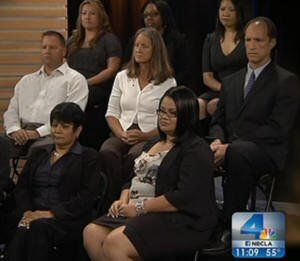NBC/LIUNA Cross Paths: Kathryn Lindberg's Story Validates Corruption Claims
Career Pilot Was Grounded For Raising Concerns About Discrimination
New Orleans, LA (November 19, 2012) - As NBC continues to look into allegations of corruption, their investigation has crossed-paths with a case the Union became involved with at the request of MG David Baldwin. During his
Senate Rules Committee testimony, Baldwin was confronted by numerous current and former California National Guard (CNG) men and women who opposed his confirmation for a number of different reasons, the main one being that they had zero faith in the ability of the CNG's Equal Employment Opportunity (EEO) office to properly handle complaints of discrimination and retaliation. Of the witnesses to take the stand, one of those was Kathryn Lindberg; a career aviator with over 4000 hours of flying experience in different Army helicopters, primarily the UH-1 Huey, the workhorse of the US Army for almost 50 years.
A Complicated Situation
To understand why employees like Kathryn can be mistreated you have to first understand the program she was working under. Kathryn was employed as a Dual-Status Technician of the National Guard; there are approximately 52,000 of these types of employees Nationwide. They are, without a doubt, the backbone of the entire National Guard structure. These types of employees fulfill a "dual role" just as their title alludes to: they are both members of the military and Federal Civil Servants at the same time. Regarding their civilian status, they are no different than an employee of the US Postal Service or an employee of the US Forest Service. The main difference is that in order to retain their Federal job, Dual-Status Technicians have to maintain satisfactory military membership in the National Guard.
It gets even more complicated. Based on the way current laws are written, these Dual-Status Technicians are employed and administered by the Adjutant Generals of the individual States and Territories. So, as far as the US Government is concerned, including the Federal Courts, although these individuals are full-fledged Federal employees, they are technically managed by a state official since the Adjutant General is appointed by the Governor of his/her respective State or Territory. Therefore, since the Adjutant General is considered a state employee, the Agencies of the Federal Government that normally have oversight and say over issues such as discrimination and whistleblower protection, like the Equal Employment Opportunity Commission (EEOC) or the Office of Special Counsel (OSC), cannot legally order the Adjutant General to take any action in respect to these Federal employees. A 2003 Government Accountability Office (GAO) report summarized it best:
Appendix V (pages 40-41):
Among all National Guard whistleblowers, federal civilian employees of the National Guard (technicians)14 face the most difficult jurisdictional and corrective action issues. They are not protected from reprisal by the military whistleblower protection statute because, as civilians, it does not apply to them.
Civilian guard technicians who allege reprisal for making a protected disclosure face at least two “severe and significant restrictions” according to a decision by the U.S. Court of Appeals for the Federal Circuit [Singleton v. Merit Systems Protection Board, 244 F. 3d 1331 (Fed. Cir. 2001)]. First, some adverse actions (for example, suspension, furlough without pay, reduction in rank, or compensation) against civilian technicians cannot be appealed to the Merit Systems Protection Board15. Second, adverse actions not covered by the guard technicians act can be appealed to the Merit Systems Protection Board, but the appeal is meaningless because of the board’s limited enforcement powers. The board has determined that its orders are not enforceable against state National Guards, and for that reason, the board is without power to supply an effective remedy even in the instance of a federal employee who can prevail on the merits of a civilian whistleblower protection act claim.
In essence, Adjutant Generals (or their representatives) can violate the law, at will, and get away with it because there is no enforcement mechanism legally in place to protect Federal employees of the National Guard.
In addition to the complications faced by Technicians on the Federal Civil Servant side of the house, Dual-Status Technicians also have limited recourse to appeal administrative actions on the military side. They truly get the worst of both worlds. This is because if an individual's military membership is terminated for any reason then they are eventually terminated from their Federal civilian job as well. This becomes a real concern after a member of the National Guard reaches 20 years of military service. Every year after 20, a National Guard member's continued military service is evaluated by a process called the Qualitative Review Board. This Board is composed of representatives appointed by the Adjutant General with the authority to decide who stays in and who is discharged from the military service. The Board is tasked with evaluating each individual's service, and then recommend retention or removal. While the process is supposed to be concise and deliberate, the Boards are usually rife with nepotism and cronyism. The decisions reached as to whether a person is retained or let go can boil down to who's friends with who, who's related to who, and who knows who. The Boards are also used as a way to get rid of Dual-Status Technicians who are "troublemakers." In other words, back-door retaliation. Basically, the decision of the Board is arbitrary, and no justification has to be given regarding the decision to keep one person or let go another. More importantly, those that are arbitrarily let go have no method of appeal or redress even if there are credible allegations of impropriety or wrongdoing. The Board's decision becomes the Adjutant General's by proxy, and no one, again, not even a State or Federal court, can overturn it.
Kathryn's Case Review
Ms. Lindberg confronted Baldwin in front of the Senate Rules Committee and told him that inaction and feet-dragging on the part of the California National Guard's EEO office emboldened those in her chain of command to continue discriminating against her. MG Baldwin addressed Ms. Lindberg's testimony directly, and assured the Senate Rules Committee that he was intent on fixing these types of issues. Baldwin went on to tell the Senators that he had asked the Union to do a 3rd Party review of Ms. Lindberg's EEO case to determine whether her allegations had merit, and whether the Agency had acted inappropriately. For the record, MG Baldwin never reached-out to the Union concerning this matter prior to his testimony. In other words, the first time the Union heard that MG Baldwin wanted us to do a 3rd party review of Ms. Lindberg's case was when he told the Senate Rules Committee during the course of his testimony.
In any event, the Union agreed to review Ms. Lindberg's case. In order to conduct a thorough investigation the Union needed access to the case file. However, we met with resistance from Baldwin's staff as soon as we tried to get any information; specifically, his Chief of Personnel, COL Michael Wells, and his Human Resources Officer, LTC Kimberly Derouen. After repeated request for the documents, they refused to release any information of substance. The only documents the Union received from COL Wells and LTC Derouen were copies of personnel action forms that are used to document administrative moves from one position to another, but they did not release any files regarding their internal investigation or handling of Ms. Lindberg's complaints.
The Union went on to conduct their review based on what Ms. Lindberg herself provided to us. Although the employee did not have access to all the relevant documents, especially internal investigatory documents, the Union was still able to piece together enough information to determine that Ms. Lindberg was most definitely discriminated against, and subsequently was the victim of retaliation for voicing her complaints. We provided our findings to MG Baldwin in a detailed 10-page report dated June 24, 2012 . However, to this day no action has been taken to correct the infractions that the Union was able to discover, even though our review of this case was done at his request.
We reached out to the California National Guard Public Affairs office for comment on this story. We asked them to answer the following questions:
1. In light of the fact that MG Baldwin himself asked the Union to do the case review, why did his staff, specifically COL Wells and LTC Derouen, refuse to release Ms. Lindberg's case file to the Union so that we could do a comprehensive review of this case? Did they make the decision not to cooperate with our case review on their own, or were they instructed/advised not to cooperate by MG Baldwin or someone else within the CNG (i.e., JAG)?
2. What action, if any, did MG Baldwin, or his staff, take regarding the findings contained in our report?
3. If no action was taken, why did MG Baldwin tell the Senate Rules Committee that he asked us to do a 3rd Party review?
4. In his testimony to the Senate Rules Committee MG Baldwin also indicated that he asked his "brand new" HRO LTC Derouen to look into the case. What, if anything, did LTC Derouen find, and what did she recommend to MG Baldwin?
At this time we have not received a reply to the questions above.
It's a very demoralizing experience when any employee has to go through this type of ordeal. It becomes even more frustrating and discouraging when you find out that the laws that are supposed to protect you don't apply because of some legal technicality. It's also inexcusable how those in power fail to protect those that work for them. It's especially frustrating when you hear leaders give lip service about how important the men and women of the military are, and how it's their duty to protect them, and then stories like Kathryn's seem to be the norm and not the exception.
In Kathryn's case, her removal from the CNG was a long and humiliating process. Little did Kathryn know that her complaint would set off a chain reaction which would eventually marginalize her, and sentence her to a no-title position behind an isolated desk where she served out the remainder of her National Guard days hoping that someone would listen to her complaints. Let's hope Kathryn's story, and the stories of the others that have come forward to NBC, will finally force the CNG to do the right thing.
Timeline
Kathryn filed her first complaint in January of 2008 after she was told by her supervisor at the time, Lieutenant Colonel (LTC) Mark VanDyke, that he was thinking about demoting her from a Supervisory Maintenance Test Pilot to just an Aircraft Pilot.
Approximately 2 months later LTC Van Dyke issued a desk memo essentially grounding her for filing an EEO complaint, an action which is considered "direct retaliation," and a clear violation of Federal law.
Almost immediately after being grounded Kathryn received her demotion paperwork in the form of an SF50 Personnel Action From. The paperwork states that it was done with Kathryn's "concurrence," but evidence the Union was able to look at shows that she was forced to accept the demotion.
One year later, in January of 2009, Kathryn was detailed to an "Un-established Position," and she would remain there until her removal.
Her nearly three-decade long flying career was unceremoniously ended by CNG leaders 3 years and 8 months after she raised concerns about discrimination. Kathryn was militarily discharged from the CNG on Aug 31, 2011, and subsequently terminated from her Federal Civil Service job on Apr 20, 2012. The way the law is written right now, Kathryn's termination, even if found to be the result of retaliation, cannot be heard or overturned in Federal Court. LTC VanDyke is still a member in good standing of the California National Guard.
Related Documents
Union Case Review
Sen. Alquist Review Copy
Sen. De Leon Review Copy
Sen. Dutton Review Copy
Sen. Fuller Review Copy
Sen. Steinberg Review Copy
14 - A technician’s employment, use, and status are defined by 32 U.S.C. § 709.
15 - The Federal Circuit noted in Singleton, that the guard technicians act provides, “notwithstanding any other provision of law” (including the civilian whistleblower protection statutes), a technician’s right of appeal to an adverse personnel action, as enumerated in the technicians act, “shall not extend beyond the adjutant general of the jurisdiction concerned.” Consequently, the Federal Circuit observed “when it comes to protection under the [civilian whistleblower protection statutes] the [guard technicians act] by its clear terms bars a technician from federal appeal rights under [the civilian whistleblower protection statutes] when the adverse action is one of those enumerated in the [guard technicians] statute.”






